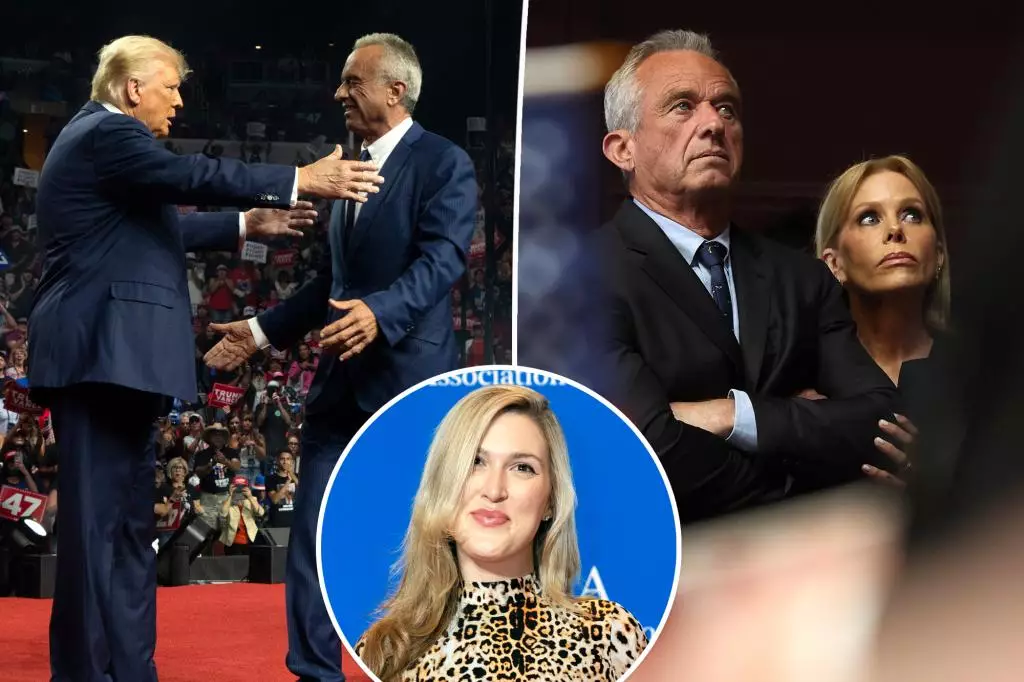In a politically charged landscape where personal scandals often lead to swift repercussions, the recent revelations about Robert F. Kennedy Jr. have stirred both intrigue and skepticism. With three women alleging romantic connections to the political scion following his controversial relationship with New York Magazine reporter Olivia Nuzzi, one might expect a significant backlash from the political sphere. However, emerging reports suggest that these claims may not only fail to hinder Kennedy’s political aspirations but could also serve to bolster his position within the Republican Party, particularly if Donald Trump ascends once again to the presidency.
Historically, political figures have found their careers derailed by revelations of personal misdeeds. Yet, the contemporary political environment has undergone a drastic transformation, one marked by a marked shift in public and political attitudes regarding personal morality. Nuzzi’s allegations, which were initially shocking, are now being perceived by some within the GOP as somewhat inconsequential. As one source remarked, “In D.C., this is barely a scandal.” This perspective reflects a broader acceptance in the party that personal indiscretions do not necessarily compromise political effectiveness.
The rise of Trumpism, with its own legacy of controversy, has contributed to a political culture in which voters appear to prioritize charisma and strategy over personal conduct. A GOP insider suggested that the party “has evolved in a good way” and is less inclined to engage in moral policing. This evolution could explain why Kennedy’s romantic escapades, rather than leading to disqualification from leadership roles, might actually enhance his appeal among voters who are increasingly disenchanted with political elitism and hypocrisy.
Intriguingly, Kennedy’s position within a potential future Trump administration has generated both speculation and concern. Some insiders speculate that while more affairs may come to light, Trump remains primarily focused on securing his electoral chances rather than dwelling on Kennedy’s marital issues. “Who cares?” remarked one source, reiterating a consensus that the American electorate appears to have moved past the kind of scrutiny that once dominated political discourse.
Kennedy’s endorsement of Trump in August, shortly before he quit his presidential candidacy, signifies a strategic alliance that may insulate him from the fallout of these revelations. Still, there are concerns regarding the implications of his alleged affairs on security clearances, which are crucial for certain government roles. However, insiders assert that many positions in the administration do not require such clearances, allowing Kennedy to potentially maintain a foothold in public service despite the allegations.
Despite the seemingly resilient attitude within the GOP, the implications of Kennedy’s alleged affairs cannot be overlooked. Kennedy’s connection to Nuzzi, which reportedly involved intimate communication but claimed not to have been physical, has placed his personal life under a magnifying glass. While his camp has denied the allegations, arguing that he has remained faithful to his wife, these denials are often met with skepticism in political circles where personal behavior frequently influences public perception.
Kennedy’s wife, actress Cheryl Hines, is reportedly distraught over both the infidelity allegations and her husband’s political embrace of Trump—a move that may further complicate their personal relationship. The tension reveals a deeper narrative about the intersections of personal and political lives, suggesting that while some voters may overlook personal flaws, the emotional toll on family members can be significant.
Kennedy’s case exemplifies the new age of political discourse where the boundaries between personal indiscretions and public accountability are increasingly blurred. As seen with Trump, who’s faced numerous allegations of infidelity and misconduct, the political fallout can be mitigated by a supportive base willing to overlook such challenges in exchange for perceived policy benefits.
This scenario raises profound questions about the future of political accountability. As parties evolve and adapt to changing electoral dynamics, the threshold for what constitutes acceptable behavior may continue to shift. The coming months will be pivotal in determining not only Kennedy’s political fate but also the role that personal ethics will play in shaping the next chapter of American politics.
Ultimately, as scandals and affairs become less of a deal-breaker and more a river of controversy that candidates must navigate, it is clear that the landscape of political morality is anything but settled. The resilience of individuals like Kennedy amid allegations suggests a complex interplay between personal conduct, public perception, and political success, challenging long-held notions of accountability within our political system.

Leave a Reply